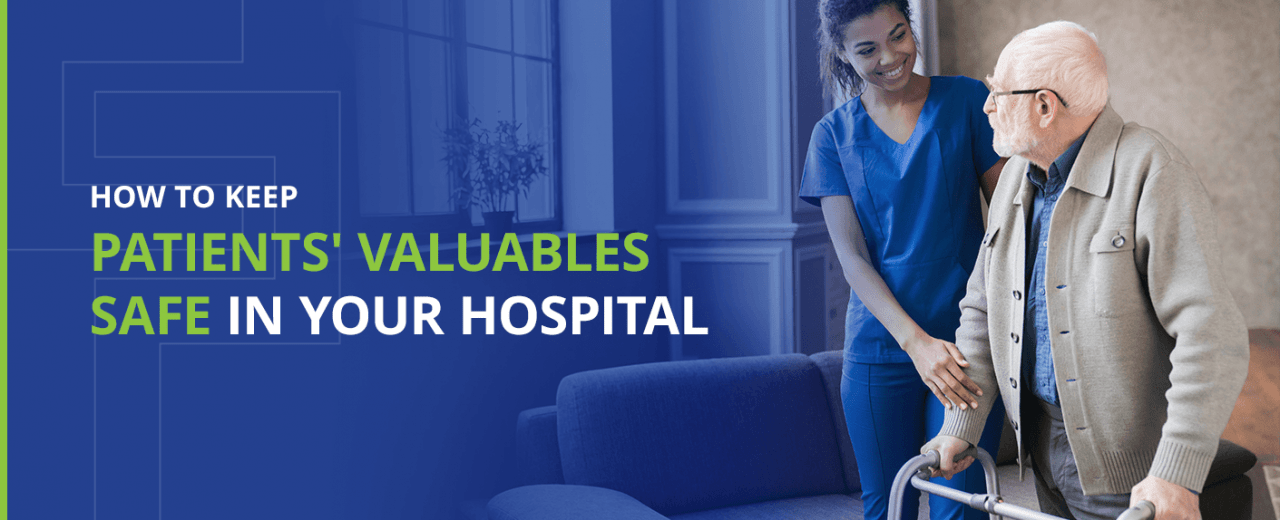
How to Keep Patients’ Valuables Safe in Hospital

Keeping valuables safe in a hospital is a big task, considering how many people are in and out of patient rooms and how many people are in the hospital as a whole. What workers do with valuables in a hospital can build or hurt the trust between the staff and the patient, potentially helping or hindering them from receiving the best care possible.
Your health care facility should understand the importance of keeping patient belongings safe and how to improve the item security process in the hospital.
Importance of Keeping Patient Belongings Safe
When a patient comes to a hospital, especially following some sort of trauma, it’s important their belongings aren’t one more thing they are worried about. Following a traumatic situation, the EMTs should have gathered as many of their belongings as they could find. Keeping items together and with the patient while traveling from the scene to their hospital room is a tall task but incredibly important.
Many benefits show the importance of patient belonging bags in a medical setting:
- Patient trust: If a patient sees their belongings are being taken care of, it will help increase their trust in letting you take care of them. They will then be able to focus on healing and making whatever medical decisions are in front of them.
- Chain of custody: The bags are identifiable and easily marked, so it is clear which patient it belongs to. This helps with documentation and ensures the belongings stay together and safe. Items should go through some sort of check-in procedure upon patient registration and checkout upon patient discharge. This leads to fewer incidents involving lost patient valuables.
- Staff focus: With patient belonging bags taking care of that aspect, it allows staff to focus solely on the patient, their healing and their comfort.
Failing to keep a patient’s belongings safe negatively affects the patient, staff and hospital. It could also lead to legal or liability issues for the hospital or health care facility.
Your facility should invest in keeping patient belongings safe. When a patient comes to a health care facility, they will need to check their items in to be kept secure during their stay if they weren’t able to leave them with someone else. At this point, the clinician is responsible for taking care of the patient’s belongings.
What you do with valuables in the hospital should be clear to all your employees. This is where it is up to the hospital to develop a secure system to keep patients’ valuables safe and organized.
Steps to Keeping Valuables Safe
1. Analyze Current Processes
Hospitals should begin by analyzing their current workflow regarding how their patients’ belongings are stored, retrieved and returned. You should be looking for ways to improve the efficiency and security of this process. This involves looking at how and why you have the processes you do.
Find your internal best practices — what is working well — and your pain points — what is going poorly. Use that information to improve your patient belonging handling process.
2. Improve and Automate
Look at the pain points you identified. Identifying and fixing these pain points is a process that should include multiple departments within your health care facility. Here are four areas that could commonly be improved in the process:
- Data collection: Make data collection accurate, simple and efficient.
- Defining storage locations: Clearly define storage locations using a tool like location barcodes to speed up the retrieval process.
- Visibility: Be sure your patients see their belongings before storing them so they know everything is together. This will save time during the retrieval process.
- Document: If they are able to, the patient should acknowledge the collecting and the retrieval of their belongings.
3. Implement Changes
Now that you know how to improve your patient belonging process, you should implement the improvements. This will require clear communication on behalf of those in charge to those responsible for carrying out the changes. Everyone involved should have a clear understanding of what the new expectations are.
It should be abundantly clear what the nursing staff should do if patients have valuables with them. Getting influential members of each team on board early can help usher the changes in more smoothly. If you need to require a training process to make the changes clearer, do so.
4. Always Improve
Once you’ve made these changes, don’t grow apathetic in how your process runs. There are always ways to improve and adjust the workflow. Gather feedback and metrics and analyze them constantly to make adjustments as necessary.
What Kind of Patient Valuable Bags Are Best?
Patient valuable bags should be high-quality and tamper-evident while also easy to clean and identify. These bags will be holding things like clothes, wallets, car keys, jewelry, and other valuables, so it’s important they are sealed tightly.
The bags can also include features like adhesive closures, numbering, and receipts, all of which help with the collecting and retrieving processes.
Choose Connover Packaging for Trusted Patient Valuable Bags
With over 30 years of experience, Connover Packaging can provide the perfect packaging solution for your health care facility. We will work alongside you as a partner and help you determine the best way to keep valuables safe in the hospital. We have bulk solutions to help you save money so you can find an inventory-friendly solution tailored to your facility’s needs.
Our delivery services are one of our top priorities because we want you to get your items with ease. From start to finish, we strive to make the process of protecting your patients’ valuables a breeze. If you’re ready to provide the best protection for your patients’ belongings at a reasonable price, request a custom quote today.
Have questions? Our team is ready to answer and find the best solution for you. Call us at 1-800-770-4906 to speak with a team member.
Share:
Get A Quick Quote
Social Media
Most Popular


Essential Plastic Bags Used in Healthcare Packaging and Their Uses


What Retailers Should Know About Plastic Shopping Bag Myths
Categories
Tags
Related Posts

How to Avoid the Top Mistakes When Using Plastic Evidence Bags
Proper evidence handling is the backbone of any successful investigation. From crime scenes to courtrooms, the integrity of physical evidence determines whether facts hold up

Essential Plastic Bags Used in Healthcare Packaging and Their Uses
In modern healthcare environments, safe and reliable packaging plays a critical role in infection control, organization, and operational efficiency. From hospitals and clinics to laboratories

Single-Use vs. Reusable Packaging Bags: What Retailers Should Know
Packaging plays a critical role in retail operations, customer experience, and brand perception. One of the most important decisions retailers face today is choosing between
